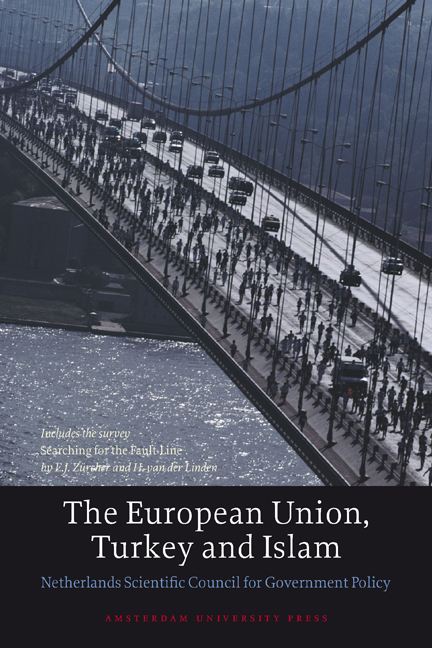Book contents
- Frontmatter
- Contents
- Summary
- Preface
- 1 Introduction
- 2 The European Union and Religion
- 3 Turkish Islam and the European Union
- 4 Conclusions
- Epilogue
- Literature
- Searching for the Fault-Line
- 5 Introduction: Turkey – Fault-Line, Frontline or Test Case?
- 6 Turkey’S Current Islamic Landscape
- 7 Turkish Islam and the Eu: a Clash of Civilisations?
- 8 Conclusion: Turkish Islam and European Civilisation
- Literature
- Websites
Epilogue
Published online by Cambridge University Press: 14 January 2021
- Frontmatter
- Contents
- Summary
- Preface
- 1 Introduction
- 2 The European Union and Religion
- 3 Turkish Islam and the European Union
- 4 Conclusions
- Epilogue
- Literature
- Searching for the Fault-Line
- 5 Introduction: Turkey – Fault-Line, Frontline or Test Case?
- 6 Turkey’S Current Islamic Landscape
- 7 Turkish Islam and the Eu: a Clash of Civilisations?
- 8 Conclusion: Turkish Islam and European Civilisation
- Literature
- Websites
Summary
The WRR does not consider that the characteristics of Turkish Islam as such constitute any obstacle to EU accession. Yet, if the Turkish accession becomes reality, will it not also be important for the relationship between the West and the Muslim world? This relationship has become increasingly problematic, for example through spiralling Islamic terror and invasions of Afghanistan and Iraq. Could Turkish accession temper the fear of an unavoidable ‘clash of civilisations’?
It is obvious that this should not be the main reason for allowing Turkey to join the EU. Accession should be judged on its own merits, on the basis of the criterion of an adequate functioning EU as a union of values and objectives. No-one will profit from a watered-down Union. However, if Turkish membership is accepted, this issue would become very relevant. For governments whose populations currently oppose a Turkish membership, this could be an important additional argument in its favour. The EU does not only want to maintain an internal legitimacy and effectiveness but, since it cannot isolate itself from the world, it also has a great interest in peaceful external relations. Now that the composition of the population of the EU is increasingly reflecting the world population, internal relations are also no longer immune to discordant relations elsewhere.
As indicated in chapter 2, the historical rationale of the European integration project was not to create a link among nations with a similar identity and culture or with equal values and standards. Nor was it a project among states with a mutual history of peace. It all began by supranational partnership and economic integration to end a history of conflict among countries that displayed great differences of identity, culture, values and standards. Looking at the situation today, and at existing animosities, one could legitimately ask whether the European integration project can again play a role in defusing conflict.
In the world today, the relationship between the West and Islam is unambiguously problematic. In the early 1990s, Samuel Huntington (1993) already argued that there would be new conflicts after the Cold War, in particular between these two civilisations. Since then, this ‘clash of civilisations’ has been accepted by many parties in Islam and in Western countries as a characterisation of the relationship between Islam and the West.
- Type
- Chapter
- Information
- The European Union, Turkey and Islam , pp. 73 - 76Publisher: Amsterdam University PressPrint publication year: 2004



